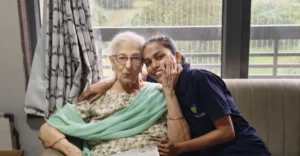Dementia is a condition that affects memory, thinking, behaviour, and eventually social interactions. It is a progressive neurodegenerative disease that is not curable but manageable with support from family and medical interventions. While dementia often affects elders, it is now common for people in their sixties to get diagnosed. Most of the early dementia cases go undiagnosed and do not access the treatment. An early onset of dementia shakes the family like a bolt but can be managed, slowed down, and taken care of in a comforting and planned way.
Signs and symptoms
While it requires a medical diagnosis, early symptoms to catch on at home when a senior member gets impacted by it are:
- Memory Lapse: Selective lapses like forgetting wallets, forgetting to switch off water tapes, not being able to place people and their names, etc.
- Confusion and despair: Trouble with organizing, sense of direction, finding the right words, retaining information, etc.
- Personality and behavioral changes: Early onset brings a sense of vulnerability. One constantly worries about forgetting, making mistakes, or upsetting people around.
- Mood swings and irritability: The inability to perform simple tasks leads to suppressed anger and irritation. It is a helpless situation not just for the patient but also for the family.
- Depression: Dementia impacts our daily lives, employment, and social interactions. It can get very lonely and dark and lead to silent depression.
Coping Mechanisms and Approach
With dementia entering any family, we need to come together and seek organized support. Consultation with doctors and therapists and bringing all family members, irrespective of age, to the same page on diagnosis is a mandate. Explain things in a way that is understood by all. It is also essential to take a quiet and deep introspective journey of the heart of the person suffering. Understand their situation and keep a calm demeanor. They may also deal more with their past than the present, so we flow along as a family and be a sounding board. Every individual on earth deserves respect and dignity. Dementia is by no means a synonym for uselessness. We need to simplify life around them and be compassionate to their situation.
Understanding Early-Onset Dementia
Steps to be taken in Dementia care
With a Dementia member, we need to gather all possible support and handhold the years to come before everything fades into oblivion for them.
- Simplify Tasks: Label stuff that falls into daily routines, be it medicines, fridge dishes, emergency phone numbers, to-do lists, reminders, alarms, etc.
- Safety: If Affordable, install sensors in water taps, doors, and household equipment. Keep your home clutter-free for easy accessibility. Install CCTV or trackers to monitor individual’s movement and alert for potential intruders or wandering away.
- Set a routine: Any fixed routine, be it meal times, exercise time, or television time, will form a set of patterns in their mind to follow through. Disrupted routines give them anxiety and make them fearful of the unknown.
- Medical intervention: After the diagnosis, timely medications are crucial. If physical presence is not a possibility, then caregivers or assisted living facilities can be thought of as an option to slow down dementia progress and give them a life that does not threaten their peace.
- Caregiving: You can employ a full-time carer or approach an Assisted Living Facility that provides round-the-clock care with medical interventions. If you cannot be a primary caregiver, then old-age homes or Medicare-assisted living can be highly effective and give you much-needed peace.
- Financial and Legal Plan: As dementia will make the individual dependent eventually, it’s important to discuss finances while the neurons are still functioning. Who will be legally nominated or have access to savings for the care and long-term treatment plans ahead? These discussions need to be picked. They may slowly lose control over themselves, but we can control what happens to them as a family.
You may like to read this: Dementia – A Guide for Families
Tips for Caregivers:
- Make it easy for both. As a caregiver, you can give the person clothes that are loose-fitted, and devoid of buttons, get shoes that do not have laces, keep hair at a manageable length, etc.
- Let their room have enough sunlight, so it doesn’t get claustrophobic or depressing.
- Go for a walk together and have conversations. If the past is what they hold on to, let that flow. You will be surprised at the stories you discover and the bonds you form.
- Introduce music to the routine so that it is therapeutic for both.
- Keep all dangerous things way out of reach. To keep your peace of mind intact.
- Get involved in planning their daily activities and to-do lists. They will not feel alone in the battle.
- Take a break in between and plan your me-times. It can be overwhelming and may affect your emotional health.
- Caregiving needs not be overbearingly emotional; do what works best for your family. If they enjoy being with like-minded people, have a set routine, be medically monitored, do not hesitate to reach out for the most suitable senior assisted living facility near you.
With dementia, most unusual experiences are about to unfold in life. Many have continued to live a normal, happy, and wholesome life despite the condition. At PapayaCare, we believe every journey is unique and different, and we customize the care plan with medical supervision. We try to give them a sense of normalcy under a distant eye in case of early stages and full-time supervision in case of advanced dementia. With our expertise and planned approach, we will walk along with you in taking care of your family members.
Call us or schedule a visit today: Explore PapayaCare’s Dementia & Memory Care Services

















